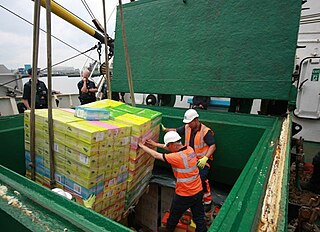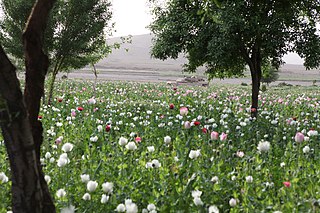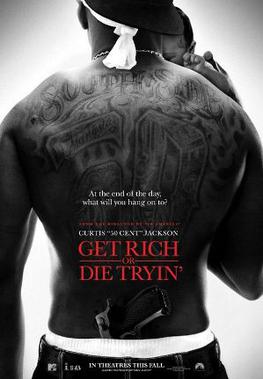
Smuggling is the illegal transportation of objects, substances, information or people, such as out of a house or buildings, into a prison, or across an international border, in violation of applicable laws or other regulations. More broadly, social scientists define smuggling as the purposeful movement across a border in contravention to the relevant legal frameworks.
A bootleg is the upper part of a boot.

The illegal drug trade, drug trafficking, or narcotrafficking is a global black market dedicated to the cultivation, manufacture, distribution and sale of prohibited drugs. Most jurisdictions prohibit trade, except under license, of many types of drugs through the use of drug prohibition laws. The think tank Global Financial Integrity's Transnational Crime and the Developing World report estimates the size of the global illicit drug market between US$426 and US$652 billion in 2014 alone. With a world GDP of US$78 trillion in the same year, the illegal drug trade may be estimated as nearly 1% of total global trade. Consumption of illegal drugs is widespread globally, and it remains very difficult for local authorities to reduce the rates of drug consumption.
Narcoterrorism, in its original context, is understood to refer to the attempts of narcotics traffickers to influence the policies of a government or a society through violence and intimidation, and to hinder the enforcement of anti-drug laws by the systematic threat or use of such violence. As with most definitions of terrorism, it typically only refers to non-state actors.
Commonly-cited arguments for and against the prohibition of drugs include the following:

The United Nations Office on Drugs and Crime is a United Nations office that was established in 1997 as the Office for Drug Control and Crime Prevention by combining the United Nations International Drug Control Program (UNDCP) and the Crime Prevention and Criminal Justice Division in the United Nations Office at Vienna, adopting the current name in 2002.

The Single Convention on Narcotic Drugs, 1961 is an international treaty that controls activities of specific narcotic drugs and lays down a system of regulations for their medical and scientific uses; it also establishes the International Narcotics Control Board.

The United Nations Convention Against Illicit Traffic in Narcotic Drugs and Psychotropic Substances of 1988 is one of three major drug control treaties currently in force. It provides additional legal mechanisms for enforcing the 1961 Single Convention on Narcotic Drugs and the 1971 Convention on Psychotropic Substances. The Convention entered into force on November 11, 1990. As of June 2020, there are 191 Parties to the Convention. These include 186 out of 193 United Nations member states and the Holy See, the European Union, the Cook Islands, Niue, and the State of Palestine.
Cassandra is a prophetess in Greek mythology who was blessed with foresight but cursed, never to be believed.

Afghanistan has long had a history of opium poppy cultivation and harvest. As of 2021, Afghanistan's harvest produces more than 90% of illicit heroin globally, and more than 95% of the European supply. More land is used for opium in Afghanistan than is used for coca cultivation in Latin America. The country has been the world's leading illicit drug producer since 2001. In 2007, 93% of the non-pharmaceutical-grade opiates on the world market originated in Afghanistan. By 2019 Afghanistan still produced about 84% of the world market. This amounts to an export value of about US $4 billion, with a quarter being earned by opium farmers and the rest going to district officials, insurgents, warlords, and drug traffickers. In the seven years (1994–2000) prior to a Taliban opium ban, the Afghan farmers' share of gross income from opium was divided among 200,000 families.

The International Day Against Drug Abuse and Illicit Trafficking is a United Nations International Day against drug abuse and the illegal drug trade. It is observed annually on 26 June, since 1989. The date June 26 is to commemorate Lin Zexu's dismantling of the opium trade in Humen, Guangdong, ending on June 25, 1839,just before the First Opium War in China. The observance was instituted by General Assembly Resolution 42/112 of 7 December 1987.
Illicit drug use in Australia is the recreational use of prohibited drugs in Australia. Illicit drugs include illegal drugs, pharmaceutical drugs when used for non-medical purposes, and other substances used inappropriately. According to government and community organisations, the use and abuse, and the illegality, of illicit drugs is a social, health and legal issue that creates an annual illegal market estimated to be worth A$6.7 billion. Estimates made in 2022 place the figure at A$11.3 billion per year.
The illegal drug trade in China is influenced by factors such as history, location, size, population, and current economic conditions. China has one-sixth of the world's population and a large and expanding economy. China's large land mass, close proximity to the Golden Triangle, Golden Crescent, and numerous coastal cities with large and modern port facilities make it an attractive transit center for drug traffickers. Opium has played an important role in the country's history since before the First and Second Opium Wars in the mid-19th century.
The Narcotics Control Board (NACOB) is a Ghanaian agency under the Ministry of Interior. It is the agency concerned with the formulation and enforcement of narcotics laws in the country. The board's work is aimed at preventing the use, import, and export of narcotics.
Drug precursors, also referred to as precursor chemicals or simply precursors, are substances used to manufacture illicit drugs. Most precursors also have legitimate commercial uses and are legally used in a wide variety of industrial processes and consumer products, such as medicines, flavourings, and fragrances.

The illicit cigarette trade is defined as "the production, import, export, purchase, sale, or possession of tobacco goods which fail to comply with legislation". Illicit cigarette trade activities fall under 3 categories:
- Contraband: cigarettes smuggled from abroad without domestic duty paid;
- Counterfeit: cigarettes manufactured without authorization of the rightful owners, with intent to deceive consumers and to avoid paying duty;
- Illicit whites: brands manufactured legitimately in one country, but smuggled and sold in another without duties being paid.

Get Rich or Die Tryin' is a 2005 American crime drama film directed by Jim Sheridan and written by Terence Winter. It stars Curtis "50 Cent" Jackson in his feature film acting debut, alongside Terrence Howard, Joy Bryant, Bill Duke, Adewale Akinnuoye-Agbaje, Omar Benson Miller, Ashley Walters and Viola Davis. The film, which contains autobiographical elements from 50 Cent's life, follows his character, Marcus Greer, a drug dealer who turns away from his criminal life to pursue his passion of rap music. The film's title is shared with 50 Cent's 2003 debut album of the same name.
"International drug convention" could mean any of several international conventions:








